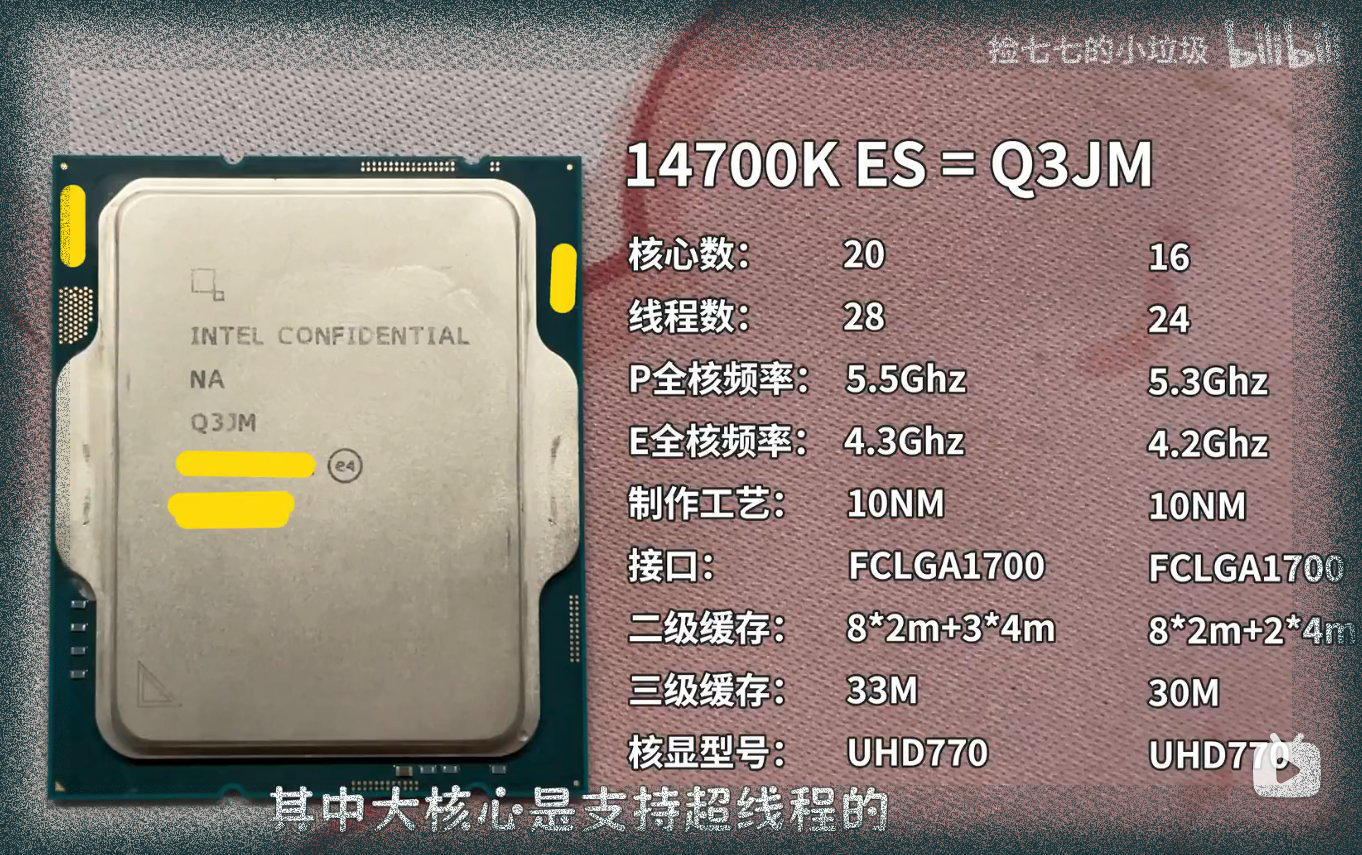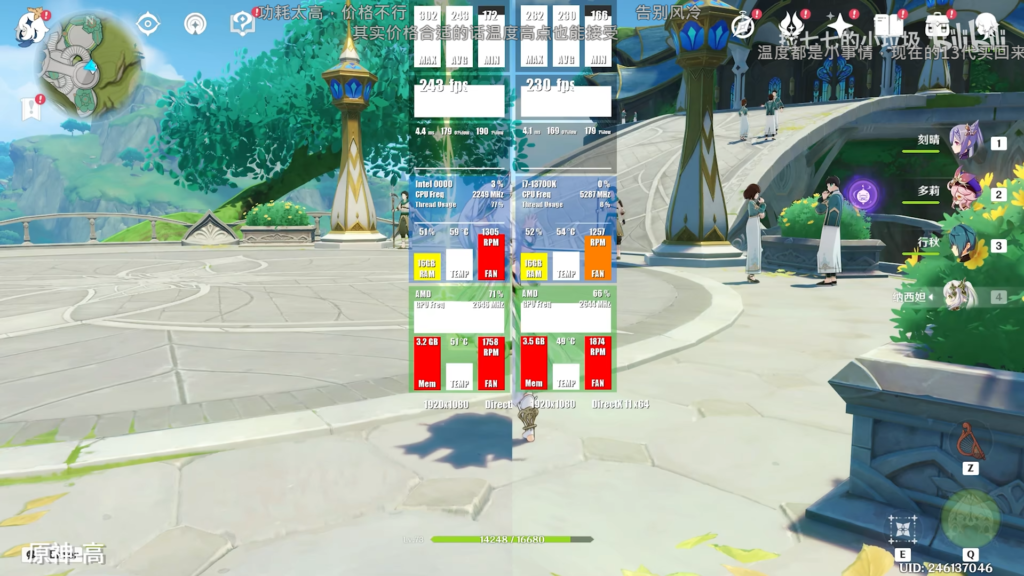Intel’s Upcoming ’14th Gen’ 20-Core i7-14700K Beats its Predecessor By Up to 16% in CPU-Z, Gaming Benchmarks Show No Significant Improvement

Over at bilibili, user ‘Picking up Qiqi’s little trash‘ has tested Intel’s upcoming i7-14700K in various benchmarks. The CPU performs remarkably well despite not featuring huge architectural revamps. What we’re looking at is an Engineering Sample, so expect the performance to improve at launch.
i7-14700K Tested
The i7-14700K boasts 20 cores / 28 threads which is a modest increase over the i7-13700K. In addition, the boost frequency has increased by 200MHz (P-Core) and 100MHz for the E-Cores. Due to the increased number of cores, the cache sees an uplift from 30MB to 33MB.

It is pertinent that we mention the test bench used for the performance benchmarks. The i7-14700K has been paired with the MSI PRO Z690-A motherboard and DDR4-4000 memory. While that will be adequate, note that you will perform much better with DDR5 memory.

Synthetic Testing
The i7-14700K manages to perform up to 16% (~17%) better than its predecessor. The CPU scores 0.76% better at worst, which is a negligible difference. Overall, we are seeing decent increments from generation to generation.

In AIDA64, the i7-14700K sips up to 300W of power. The temperatures reach as high as 100*C, meaning that you will indeed need a beefy cooling solution. On reaching 5.4GHz, the voltage was measured to be 1.35V.

After limiting the CPU to ~260W, the temperatures dropped to acceptable levels. The user may also have used a different cooling solution. Moreover, the voltage here remains at a steady ~1.3V.

Gaming Benchmarks
Moving over to the gaming benchmarks, we start to see more ‘in-real-life’ testing scenarios. The leaker has used AMD’s Radeon RX 7900 XT for the sake of these tests. Other specifications should remain similar as well.
PUBG at 1080p is a piece of cake for the i7-14700K. The CPU averages 172 FPS, which is 5 FPS higher than the i7-13700K. Not the highest improvement, but that’s acceptable for an early sample.

Both CPUs are almost identical in Apex Legends. We believe that the game’s engine is bound since both CPUs do not score any more than 300 FPS. Interestingly, the i7-13700K has a higher GPU utilization, which in theory should net us more FPS but that’s not the case.

Forza Horizon is the first game where the i7-14700K loses to the i7-13700K. The GPU utilization is max across both setups. However, the i7-14700K is much cooler at 50*C (A Delta of 10*C), so this is most likely the Engineering Sample factor is at play here.

CS:GO shows the i7-14700K in lead, but that lead is so small that it becomes insignificant. In fact, the scale of this lead can be put aside as a small measurement mistake.

In Genshin Impact, the i7-14700K is slightly faster than its Raptor Lake counterpart. We should remind users that Genshin Impact is locked at 60 FPS and the only way one can unlock the framerate is via mods, which being against the ToS, can lead to a ban.

Other games show similar results as well. To keep things short, the i7-14700K is faster than the i7-13700K in gaming, but the difference is not perceivable. The real advantage of this CPU comes in the form of multi-threaded tasks and other workloads.
Is the i7-14700K a Viable Option?
The i7-14700K has 4 more cores and higher clock speeds than the i7-13700K. This alone can grant it a fair increase in performance, though do not expect miracles. Raptor Lake Refresh will contend against AMD’s Zen4-X3D lineup until Zen5 arrives which is when Intel will unleash Arrow Lake.
| Raptor Lake Refresh | Cores/Threads | Max Clocks | Raptor Lake | Cores/Threads | Max Clocks | ||||
| i9-14900K/KF | 24/32 | 6GHz | i9-13900K | 24/32 | 5.8GHz | ||||
| i9-14900 | 24/32 | 5.8GHz | i9-13900 | 24/32 | 5.6GHz | ||||
| i7-14700K/KF | 20/28 | 5.6GHz | i7-13700K | 16/24 | 5.4GHz | ||||
| i7-14700 | 20/28 | 5.4GHz | i7-13700 | 16/24 | 5.2GHz | ||||
| i5-14600K/KF | 16/24 | 5.3GHz | i5-13600K | 14/20 | 5.1GHz | ||||
| i5-14600 | 14/20 | 5.2GHz | i5-13600 | 14/20 | 5GHz | ||||
| i5-14500 | 14/20 | 5GHz | i5-13500 | 14/20 | 4.8GHz | ||||
| i5-14400 | 10/16 | 4.7GHz | i5-13400 | 10/16 | 4.6GHz | ||||
| i3-14300 | 6/12 | – | – | – | |||||
| i3-14100 | 4/8 | 4.7GHz | i3-13100 | 4/8 | 4.5GHz | ||||





